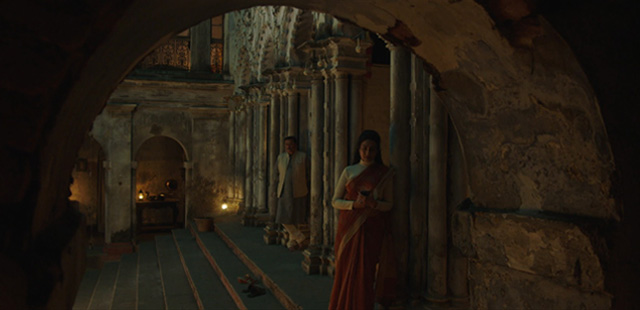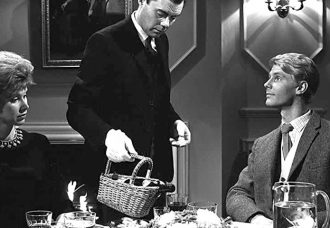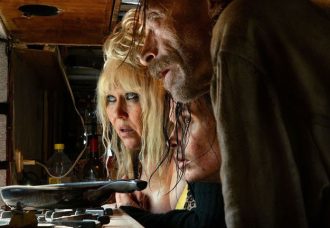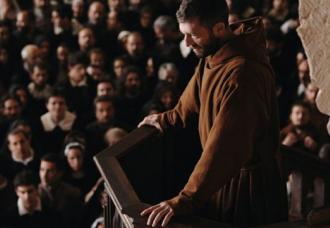In his fourth film, Mahishasur Marddini, Ranjan Ghosh returns with a theme that compels viewers to introspect as deeply as possible. He plumbs the depths of mankind’s inhuman acts violating the feminine gender, and draws attention to the sanctimonious and silent folks of civilized society. Are they truly a notch above the rest?
To distinguish between reality juxtaposed with metaphors in an intense, hard-hitting film is much like watching a staged drama. When the characters reflect upon incidents from their own lives in this tightly knit film, the infamous Shakespearean words flash across the mind from Lady Macbeth’s monologue: “Out, damned spot…” Although personal ambition is not the key driver of the film’s story, this Bengali writer/director’s depiction of human foibles and hypocrisy is commendable.
In Mahishasur Marddini Ghosh draws attention to the greater sin of silence, inaction, and mute acceptance of heinous crimes against women and the girl child. When passive bystanders from both genders stand watching, they are just as culpable, or perhaps more so than the actual perpetrators. Atrocities and crimes that degrade the feminine gender seem to be rising unabated. Abandoned, abused, ever since she is born, the girl child is a target for depraved minds. Sufferings are inflicted not only upon adult women, but even infant girls are unsparingly tainted.
Through a compelling story, skilled narrative, and an unique and unusual treatment, the film condemns what is passively construed as the fate of targeted victims. The director’s understanding of human emotions and frailties across social strata, age and gender is evident. Steering his film astutely, Ghosh strives for a sea change in attitude, making his case for us all, individually and collectively as a society.
Against a backdrop of the multi-armed Durga, slayer of Mahishasur the demon, the goddess appears formidable even in her clay form. Charged with tension, the film is shot largely in the vast courtyard of a decrepit mansion. The entire tone is subdued. The glow of low-wattage bulbs lends to the film’s haunting quality through the literal and figurative darkness of a single night. The director and his cinematographer Subhadeep Dey successfully create a visual sense of urgency. As the protector of all that is good, while destroying all that is evil, the lion upon which the goddess is seated must remain vigilant at all times, especially during the long eventful night. Subconsciously, the audience too remains alert, eager to see daylight, if only to escape from the murky shadows that engulf everyone.
The story, set in a single night, stitches together a series of events that have occurred not only within, but also for the most part outside the mansion. Amit Pal gets credit for his seamless edit that lends an urgency and tension to the drama. Avijit Kundu’s background score does not overpower the story or its drama. The music mingles with the turmoil through this epic night.
The film draws consistent performances. An understated act with her emotions reined in, the seasoned Rituparna Sengupta—as an austere-attired landlady—has a challenging role. In her character, she is also striving to be a cosmonaut raring to travel across space. Her sights are set far. Sengupta displays composure and confidence that speak of her versatility, her innate skills, and acting prowess. It also speaks well of Ghosh, who had directed her for Rong Beronger Korhi (2017), Ahaa Re (2019), and now for Mahishasur Marddini (2022).
As a political player – an election strategist – actor Parambrata Chattopadhyay’s delivery is charged, but in a volte face he too surprises the owner of the huge mansion—his sister, as also the viewer. Seasoned actor Saswata Chatterjee plays a dubious political leader who provokes everyone with élan.
Apart from the known actors in the film, are four promising newcomers Abhyuday Dey, Arunima Halder, Sritama Dey, and debutant Aryuun Ghosh. They play young students, all from varied backgrounds, who live together as paying guests under one roof. Individually, their personal stories have a dark side. The mansion with a wraparound verandah makes for a perfectly staged setting where each of them makes a mark.
The motley characters on this large canvas will not escape the viewer’s attention either.
There is a certain kind of maturity in the making of the film, for a subject that is as delicate as it is explosive. Ghosh strikes a fine balance, sparing the viewer from visual pain. The film transcends entertainment, and cuts across ethnic and linguistic borders. It goes beyond an apology to all women, especially to those who are often the victims of unspeakable crimes. Staged as a theatre-drama with actors entering and exiting from the ‘wings’, uttering their lines, playing their parts, and all of this cinematically, the film forces us to open our eyes against those crimes that ostensibly go unseen, brushed away under the bloodied carpet of cultural acceptance, political greed and society’s resignation. They occur not just in the form of the frequent rapes and murders one reads about in the news, but also as seemingly smaller crimes committed commonly behind closed doors across families and among friends.
Mahishasur Marddini is a strongly relevant film with an urgent drama that unfolds not just in its fictional world, but one that rears its ugly head everyday in places you would least expect to find. When the curtains draw to a close, tears won’t roll, instead, ignited embers will leave you scorched within.
IMDb link of Mahishasur Marddini, which played recently a the 22nd New York Indian Film Festival








